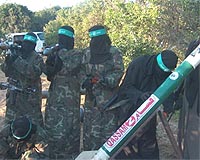| . |  |
. |
Jerusalem (AFP) Dec 27, 2010 Israeli Prime Minister Benjamin Netanyahu said on Monday that an "interim agreement" with the Palestinians could be a solution if efforts to clinch a comprehensive peace accord fail. But his suggestion was swiftly rejected by the Palestinians who insisted on an overall agreement that would take into account the fate of Palestinian refugees and the thorny issue of Jerusalem. "There could be an situation in which talks with the Palestinians hit a brick wall over the issues of Jerusalem and the right of return (of refugees), and in that case the result would be an interim agreement," Netanyahu said in an interview on Channel 10 private television. "It certainly is a possibility," the prime minister said. "But if the Palestinians accept a demilitarised state and renounce de facto to the right of return, I'll go all the way and I think that the majority of the country (Israel) will follow me," Netanyahu added. A spokesman for Palestinian president Mahmud Abbas shot down the suggestion. "For the Palestinians, any suggestion of reaching an interim agreement is unacceptable because it omits Jerusalem and the issue of refugees," spokesman Nabil Abu Rudeina said. Chief Palestinian negotiator Saeb Erakat also dismissed Netanyahu's suggestion, saying: "interim solutions are rejected part and parcel." "It's now time for final solutions that include Jerusalem, refugees, borders, security, settlements, water and the release of all Palestinian prisoners held in Israeli jails," he said. Direct talks between Israel and the Palestinians, the first for nearly two years, began in Washington on September 2. But they stalled when a partial 10-month freeze on Israeli settlement building expired on September 26. The Palestinians refused to resume negotiations without a new moratorium and Washington admitted on December 7 that it had failed to convince Israel to renew the building curbs. Palestinian negotiators have emphasised a set of alternatives to new talks, including seeking recognition of a Palestinian state along the borders that existed in 1967, before the Six Day War.
earlier related report "It is forbidden for us to reach a comprehensive deal today with the Palestinians. To put it clearly, you have to understand that their government is not legitimate," he told a meeting in Jerusalem of Israeli ambassadors. Lieberman pointed to the fact that the government of Palestinian president Mahmud Abbas had lost control of the Gaza Strip to rival Hamas and postponed elections after its term had expired. "It is a government that has postponed elections three times, that lost elections, that does not hold elections, does not plan to hold elections and there are no guarantees that next time they do hold elections, that Hamas won't win again," Lieberman said. He also said the Palestinians would reject any deal from Israel, no matter how generous, and that there were unbridgeable gaps on Israeli security issues. "Even if we offer the Palestinians Tel Aviv and go back to the 1947 borders, they would find reasons not to sign a peace deal with us," he said. The Palestinian Authority, dominated by Abbas's secular Fatah movement, has repeatedly postponed national and local elections, while Hamas has refused to let them be held in Gaza. Hamas, which won a landslide victory in the last parliamentary elections in 2006, has said there can be no new elections without reconciliation with Fatah. The Islamist movement seized power in Gaza in June 2007 when it ousted forces loyal to Abbas in a week of bloody street battles, the culmination of years of struggle between the two main Palestinian movements. The two groups struggled for months to reach a unity deal under Egyptian mediation but the efforts collapsed late last year when Hamas refused to agree to a proposal that was signed by Fatah. Lieberman, the hardline leader of the Yisrael Beitenu party, has been largely sidelined by Prime Minister Benjamin Netanyahu in peace talks with the Palestinians. Direct talks between Israel and the Palestinians, the first for nearly two years, began in Washington on September 2 but quickly stalled when a 10-month Israeli settlements freeze expired on September 26.
Share This Article With Planet Earth
Related Links
 Israeli airstrikes hit Gaza after rocket attack
Israeli airstrikes hit Gaza after rocket attackJerusalem (AFP) Dec 25, 2010 Israeli warplanes hit four targets in the Gaza Strip early Saturday, wounding at least two people, officials and witnesses said and knocking out power in a large swathe of the strip. The strikes came after militants fired a mortar and rocket into Israel on Friday, according to the army. One of the strikes in central Gaza targeted a car as it was pulling up near a site used by Hamas' mili ... read more |
|
| The content herein, unless otherwise known to be public domain, are Copyright 1995-2010 - SpaceDaily. AFP and UPI Wire Stories are copyright Agence France-Presse and United Press International. ESA Portal Reports are copyright European Space Agency. All NASA sourced material is public domain. Additional copyrights may apply in whole or part to other bona fide parties. Advertising does not imply endorsement,agreement or approval of any opinions, statements or information provided by SpaceDaily on any Web page published or hosted by SpaceDaily. Privacy Statement |